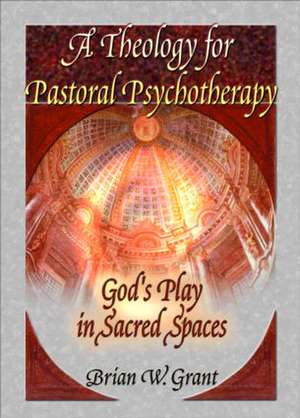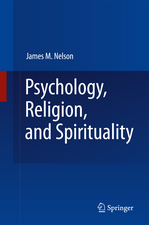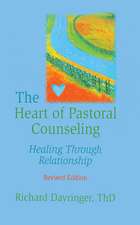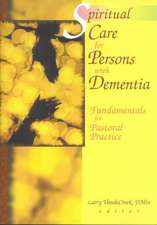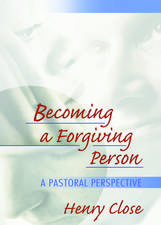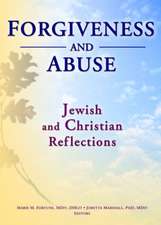A Theology for Pastoral Psychotherapy: God's Play in Sacred Spaces
Autor Brian Grant, Richard L. Dayringeren Limba Engleză Paperback – 21 sep 2001
This unique book examines the role of pastoral psychotherapy as it relates to the individual, the community, and God, and describes the process of pastoral psychotherapy in detail. It identifies healing as a mark of God's activity, and then shows how God, through healing, creates communities that ultimately shape the selves and personalities within them. Pastoral psychotherapy is a sanctified act taking place in a sanctified space. It occurs in “sacred space” as defined/created/hallowed by God, the community, the therapist, and the client. The delineating of this sanctified holy space separates what goes on in therapy from the secular, ordinary processes of life. A Theology for Pastoral Psychotherapy: God's Play in Sacred Spaces finds God in the creation of each sacred space.
Pastoral psychotherapy has developed as a means of enabling individuals and communities to cope with the ills of the modern age. It addresses sin and evil in today's world, changing the way that clients relate to people, ideas, and events in their communities, families, and individual psyches. A Theology for Pastoral Psychotherapy: God's Play in Sacred Spaces describes the process of psychotherapy from a theological point of view. It shows how God hallows sacred spaces and explores the power of God to stimulate the search for healing.
A Theology for Pastoral Psychotherapy: God's Play in Sacred Spaces:
- explores the sharing of selves as presented by theorists on intersubjectivity
- identifies the creation of the therapy dyad in the work of the Holy Spirit, drawing on new trinitarian theology
- explores ways in which therapy both is and is not an extension of the work of Christ
- shows how God lures us toward spiritual growth
- links psychoanalysis to the mystical disciplines, interweaving mystical Christianity, object-relations view of psychoanalysis, and process theology
| Toate formatele și edițiile | Preț | Express |
|---|---|---|
| Paperback (1) | 266.64 lei 43-57 zile | |
| Taylor & Francis – 21 sep 2001 | 266.64 lei 43-57 zile | |
| Hardback (1) | 1166.38 lei 43-57 zile | |
| Taylor & Francis – 23 oct 2001 | 1166.38 lei 43-57 zile |
Preț: 266.64 lei
Preț vechi: 280.67 lei
-5% Nou
Puncte Express: 400
Preț estimativ în valută:
51.02€ • 53.41$ • 42.47£
51.02€ • 53.41$ • 42.47£
Carte tipărită la comandă
Livrare economică 31 martie-14 aprilie
Preluare comenzi: 021 569.72.76
Specificații
ISBN-13: 9780789012012
ISBN-10: 0789012014
Pagini: 254
Dimensiuni: 152 x 229 x 43 mm
Greutate: 0.36 kg
Ediția:1
Editura: Taylor & Francis
Colecția Routledge
Locul publicării:Oxford, United Kingdom
ISBN-10: 0789012014
Pagini: 254
Dimensiuni: 152 x 229 x 43 mm
Greutate: 0.36 kg
Ediția:1
Editura: Taylor & Francis
Colecția Routledge
Locul publicării:Oxford, United Kingdom
Public țintă
Professional Practice & DevelopmentCuprins
Contents
- Acknowledgments
- Introduction
- The Basis in Faith
- The Plan of the Book
- Part I. The Context of Pastoral Psychotherapy
- Chapter 1. God and the World
- The Marks of Healing
- A World Flawed and Good
- The Condition of Western Society
- The Tension of Individual and Community
- God Among the Influences
- Chapter 2. God's Play and Human Community
- Communities Jewish and Christian
- Communities and Their Faiths
- Bion, the Self, and the Group
- Community Distortion and Its Pain
- Choices We Must Make
- Our Gifts to the Community
- Chapter 3. God in the Creation of Selfhood
- The Structure of Experience
- The Transmission of Ego and Culture
- The Role of Internal Space
- Internalizing the Other
- The Re-Articulation of Self
- The Problems in Our Growing
- The Potential for Abuse
- Chapter 4. God's Obstacles: Sin and Evil
- The Rupture of Community
- The Pretense of Control
- Preferred Sins of the Post-Modern West
- The Organization of Sinful Power
- Evil's Invasion of the Self
- The Entrenchment of Sin
- Part II. Pastoral Psychotherapy as the Play of God
- Chapter 5. The Hope of Pastoral Psychotherapy
- Beginnings of Liberation
- Memory as an Opening for Grace
- The Therapist's Contribution
- The Therapist and the Space
- The Ground Rules and the Frame
- The Context for Psychotherapy
- Chapter 6. The Hallowing of the Space
- Community Creates the Space
- Hallowing Through the Therapist
- The Client Hallows the Space
- Chapter 7. Sacred Play in Hallowed Spaces
- Connection, Container, and Reverie
- The Thinker and the Thought
- The Entry into Sabbathing
- The Fertile Middle Phase
- To Exploration and Action
- Chapter 8. Transference, Intersubjectivity, and the Holy Spirit
- Countertransference As an Asset
- The Classic Doctrine of the Holy Spirit
- Transference, Countertransference, and Intersubjectivity
- The Enabling of the Holy Spirit
- Spirit in the Therapy
- Crisis, Participation, Communion
- Chapter 9. Therapist As Bearer of the Spirit: Psychotherapy and Christology
- The Recent History of Christology
- Jesus--How Unique and Unique How?
- Therapist As Christ Figure: How and How Not
- The Meaning of Our Daily Lives
- Suffering--Messianic and Therapeutic
- The Content of the Saving Claim
- Money, Profession, and the State
- Chapter 10. The Play of God: Powerful Selves in Empowering Community
- The Hallowed Space
- Play
- Bursts of Clarity
- Birth into the Hallowed Space
- Therapy As Liberating Multiplicity
- Engaging the New World
- The Messianic Task of Psychotherapy
- The Self and the Community
- Naming the Mystery
- Notes
- Bibliography
- Index
- Reference Notes Included
Notă biografică
Authored by Grant, Brian; Dayringer, Richard L
Descriere
This unique book examines the role of pastoral psychotherapy as it relates to the individual, the community, and God, and describes the process of pastoral psychotherapy in detail. It identifies human healing as a mark of God's activity on earth, and then shows how God, through healing, creates communities that ultimately shape the selves and personalities within them. Pastoral psychotherapy is a sanctified act that takes place in a sanctified space. Therapy occurs in “sacred space” as defined/created/hallowed by God, the community, the therapist, and the client. The delineating of this sanctified holy space separates what goes on in therapy from the secular, ordinary processes of life.
To view an excerpt online, find the book in our QuickSearch catalog at www.HaworthPress.com.
To view an excerpt online, find the book in our QuickSearch catalog at www.HaworthPress.com.
